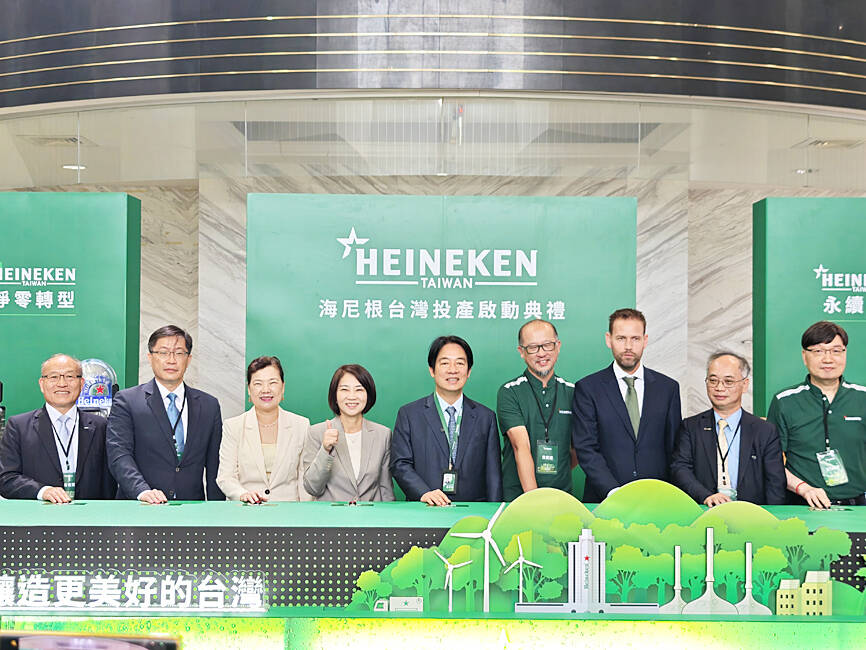Dutch brewing company Heineken NV on Friday announced an investment of NT$13.5 billion (US$414.62 million) over the next five years in Taiwan.
The first multinational brewing company to operate in Taiwan, Heineken made the statement at a ceremony held at its brewery in Pingtung County.
It also outlined its efforts to make the brewery “net zero” by 2030.

Photo: Chen Yen-ting, Taipei Times
Heineken has been in the Taiwanese market for 20 years, Heineken Taiwan managing director Jeff Wu (吳建甫) said.
With strong support from local consumers, the Dutch brewery decided to transition from sales to manufacturing in the country, Wu said.
Heineken assumed majority ownership and management rights of the Long Chuan Zuan Co (龍泉鑽興業) brewery in Pingtung County’s Neipu Township (內埔) in 2022.
The brewery began production in the first quarter of this year.
Wu said that Heineken hopes to supply “Made in Taiwan” products to neighboring countries from its Pingtung brewery, allowing Taiwan-made products to gain global recognition.
Taiwan is Heineken’s second-largest export market in the world, with production at the Pingtung brewery looking to supply the East Asian market, Vice President William Lai (賴清德) said during his speech at the ceremony.
The investment means a lot to Taiwan and its farmers, Lai added.
He said that Heineken’s Pingtung brewery seeking to go net zero is truly remarkable and should serve as a benchmark for others in Taiwan’s brewing industry.
The president-elect also mentioned Pingtung’s fertile soil and skilled farmers, saying that he hopes locally sourced brewing barley would elevate the Pingtung brewery and make it one of the Dutch company’s top-quality breweries among its 160 around the world.
Pingtung County Commissioner Chou Chun-mi (周春米) was also in attendance.
Chou said she was very happy that Pingtung is the first city in Taiwan to be chosen for production by an international brewing company and is proud to see “Made in Taiwan” on Heineken canned beer.

SELL-OFF: Investors expect tariff-driven volatility as the local boarse reopens today, while analysts say government support and solid fundamentals would steady sentiment Local investors are bracing for a sharp market downturn today as the nation’s financial markets resume trading following a two-day closure for national holidays before the weekend, with sentiment rattled by US President Donald Trump’s sweeping tariff announcement. Trump’s unveiling of new “reciprocal tariffs” on Wednesday triggered a sell-off in global markets, with the FTSE Taiwan Index Futures — a benchmark for Taiwanese equities traded in Singapore — tumbling 9.2 percent over the past two sessions. Meanwhile, the American depositary receipts (ADRs) of Taiwan Semiconductor Manufacturing Co (TSMC, 台積電), the most heavily weighted stock on the TAIEX, plunged 13.8 percent in

A wave of stop-loss selling and panic selling hit Taiwan's stock market at its opening today, with the weighted index plunging 2,086 points — a drop of more than 9.7 percent — marking the largest intraday point and percentage loss on record. The index bottomed out at 19,212.02, while futures were locked limit-down, with more than 1,000 stocks hitting their daily drop limit. Three heavyweight stocks — Taiwan Semiconductor Manufacturing Co (TSMC, 台積電), Hon Hai Precision Industry Co (Foxconn, 鴻海精密) and MediaTek (聯發科) — hit their limit-down prices as soon as the market opened, falling to NT$848 (US$25.54), NT$138.5 and NT$1,295 respectively. TSMC's

TARIFFS: The global ‘panic atmosphere remains strong,’ and foreign investors have continued to sell their holdings since the start of the year, the Ministry of Finance said The government yesterday authorized the activation of its NT$500 billion (US$15.15 billion) National Stabilization Fund (NSF) to prop up the local stock market after two days of sharp falls in reaction to US President Donald Trump’s new import tariffs. The Ministry of Finance said in a statement after the market close that the steering committee of the fund had been given the go-ahead to intervene in the market to bolster Taiwanese shares in a time of crisis. The fund has been authorized to use its assets “to carry out market stabilization tasks as appropriate to maintain the stability of Taiwan’s

In a small town in Paraguay, a showdown is brewing between traditional producers of yerba mate, a bitter herbal tea popular across South America, and miners of a shinier treasure: gold. A rush for the precious metal is pitting mate growers and indigenous groups against the expanding operations of small-scale miners who, until recently, were their neighbors, not nemeses. “They [the miners] have destroyed everything... The canals, springs, swamps,” said Vidal Britez, president of the Yerba Mate Producers’ Association of the town of Paso Yobai, about 210km east of capital Asuncion. “You can see the pollution from the dead fish.